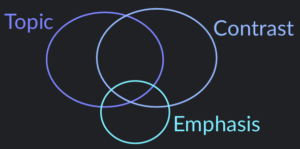Usage
i) Contrast marking
얼굴은 예뻐.
She has a pretty face (but the rest of her…)
ii) Topic marking
철수는 학생이다.
철수 is a student.
iii) Emphatic effects
사실은 처음 봤을때부터 널 좋아했어.
Honestly, I’ve liked you from the moment I first saw you.
Marking
| Noun | Marking | |
|---|---|---|
| Vowel | 남자 | 남자는 |
| Consonant | 사람 | 사람은 |
Contents
Introduction
i) Contrast marking
ii) Topic marking
iii) Emphatic effects
Additional details
Associated grammar
See also
Bibliography
User examples
Introduction
Particle 은/는 is used by speakers for three overlapping reasons: contrast, topic and emphasis. These concepts will be explained throughout.

Interestingly, 은/는 can attach to almost anything from nouns to other particles to grammatical forms.
Noun:
학교 > 학교는
우리 학교는 50년 전에 지어졌다.
Our school was built 50 years ago.
Particle:
에 > 학교에는
우리 학교에는 큰 운동장이 없다.
Our school (in comparison) doesn’t have a big playing field.
Adverb:
잘 > 잘은
잘은 모르겠지만…
I don’t know it well… (but I know a bit)
Grammatical form:
-고 있다 > 공부하고는 있다
공부하고는 있다
I’m studying, (but I’m not learning anything)
i) Contrast marking
Particle 은/는 can be used for contrastive effects. In such cases, 은/는 helps draw attention to the items being contrasted.
A: What do you think of 영희?
B: 얼굴은 예뻐.
B: She has a pretty face (but the rest of her…)
In this case, 얼굴 (face) would normally be marked with 이 or have no marking. However, the speaker has decided to mark 얼굴 with 은 — drawing the listener’s attention to this particular item. The effect now is that the listener can’t help but contrast 얼굴 with something else; perhaps her personality.
This example shows how 은/는 highlights an item, and this can (at times) have the effect of contrast.
ii) Topic marking
As a topic marker, particle 은/는 attaches to the topic of the sentence.
철수는 학생이다.
철수 is a student.
Here 은/는 has the effect of saying “I’m about to say something about 철수 now. Do I have your attention? Here it is… He’s a student”.
One reason why 은/는 has its common name of ‘topic particle’ is its apparent ability to topicalise different parts of the sentence. This is where a sentence element (excluding the verb) comes to the front of the sentence and becomes the sentence topic.
Topic as a subject:
[영희는] 남자 친구에게 편지를 보냈다.
[영희] sent a letter to her boyfriend.
Topic as a direct object:
[편지는] 영희가 남자 친구에게 보냈다.
[A letter] 영희 sent to her boyfriend.
Topic as an indirect object:
[남자 친구에게는] 영희가 편지를 보냈다.
[To her boyfriend], 영희 sent a letter.
Topic as a source:
[영희한테서는] 남자 친구가 편지를 받았다.
[From 영희], her boyfriend received a letter.
See the videos below for more information
iii) Emphatic effects
Although particle 은/는 is best known for its contrast and topic marking, it can also be used to simply give emphasis to what it attaches to.
사실은 처음 봤을때부터 널 좋아했어.
Honestly, I’ve liked you from the moment I first saw you.
The effect of 은 here is to draw in the listener’s attention and make the confession more emphatic.
This effect usually occurs when 은/는 is attached to grammatical forms.
철수는 아침을 급하게 먹고서는 학교에 갔다.
철수 quickly ate breakfast and went to school.
Here the use of 는 is optional and its inclusion makes the action (eating) appear more emphatic or intense.
Additional details
General
• The fundamental purpose of particle 은/는 remains debated by linguists. Some argue that it’s primarily a topic marker and that contrast derives from this. Others argue that it’s primarily a contrast marker from which topicality derives.
• In casual use, particle 은/는 is sometimes abbreviated to ㄴ. For example: 나는 > 난.
Tone
• Contrary to some suggestions, contrastive 은/는 does not appear to take a higher pitch or longer enunciation.
Associated grammar
[Please ignore: placeholder for future update]
See also
Bibliography
Affiliate links help support uK.
— Kim, I. Korean -(n)un, Salience, and Information Structure. (2013).
— Kim, I. Is Korean -(n)un a topic marker? On the nature of -(n)un and its relation to information structure. (2015). Lingua, 154, 87–109.
— Kim, I. Can Korean -(n)un mark (contrastive) focus?. (2016). Language Sciences, 56, 105–117.
— Jun, Y. (2015). Focus, Topic, and Contrast. In L. Brown & J. Yeon (Eds.), The Handbook of Korean Linguistics. Oxford: Wiley-Blackwell.
— Maynard, S.K. (1987). Thematization As a Staging Device in the Japanese Narrative. In J. Hinds, S. K. Maynard, & S. Iwasaki (Eds.), Perspectives on Topicalization: The Case of Japanese “Wa”. Amsterdam/Philadelphia: John Benjamins Publishing Company.
— Sohn, H. Theme-Prominence in Korean. (1980). Korean Linguistics, 2(1), 1–19.
User examples
ii) Topic marking
Context: Poem.
내 마음은 호수요.
My heart is a lake.
[Submitted by 주호]
Send in an example!